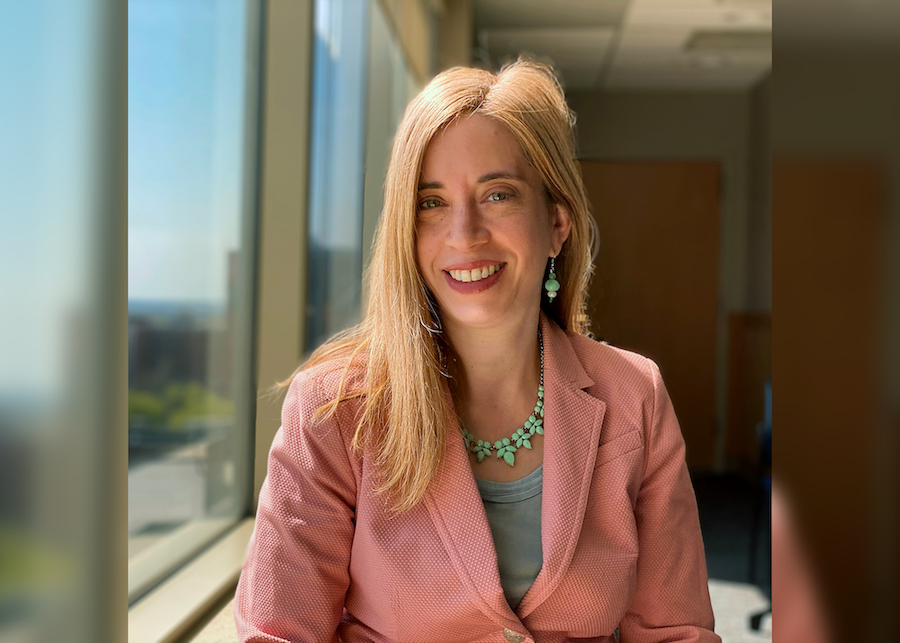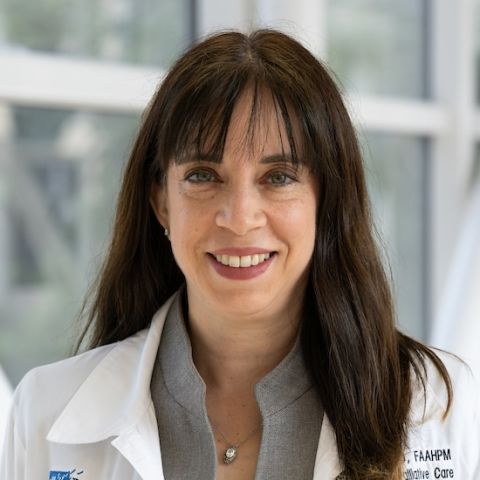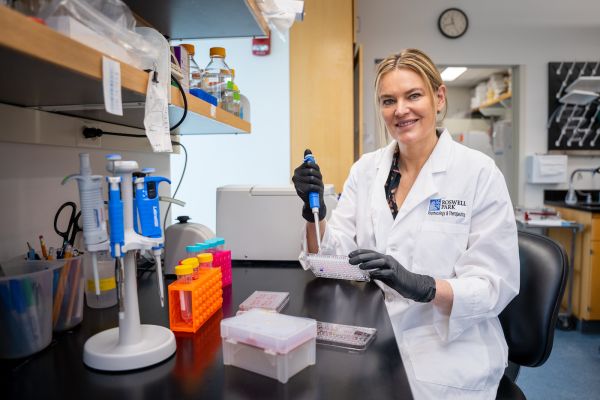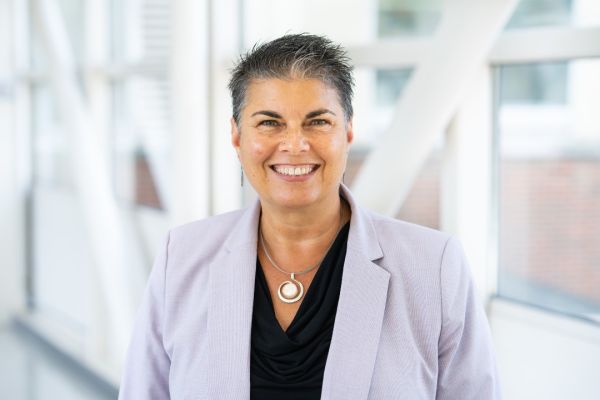“I get to know patients and help heal their physical and emotional pain and improve their quality of life at all stages of treatment.”
When people hear the term “palliative care,” they often mistakenly equate it to end-of-life or hospice care. But Amy A. Case MD, FAAHPM, and the Lee Foundation Endowed Chair of the Department of Palliative and Supportive Care at Roswell Park Comprehensive Cancer Center, wants you to know that palliative care is about living, specifically the multitude of ways that patients and their families can achieve a better quality of life during any stage of their treatment. “Medical evidence shows that patients who receive palliative care live longer and enjoy better quality of life and satisfaction, reduced pain, and less anxiety and depression.
"We encourage patients to take advantage of palliative care sooner instead of later during their treatment,” says Dr. Case. As a pioneer and innovator in the field, Dr. Case continues to expand the supportive and palliative care services offered at Roswell Park with new approaches to pain management, emotional and medical support, in addition to patient and employee resiliency with a team that includes experts in physical symptom management, mental health, geriatrics, spiritual support, financial and health care planning, social work and more.
A lifetime of carving new paths
As a high school student in Buffalo, Dr. Case was creative and artsy. “I played in an alternative rock band and I continue to love music, art and literature. When I started taking biology in high school, I really liked the analytical nature of how things worked, but I also considered it from an artsy, humanistic angle,” she says. In short, she saw things not always as black and white, but also in shades of grey and the spaces in between.
It is not surprising then that when Dr. Case began her career as a physician, she saw not only the diagnostic numbers and statistics of patients’ illnesses, but also the spaces in between: the humanity, physical and emotional suffering, and the power of getting to know patients and helping them find ways to ease their pain and fears. Dr. Case was the first person in her family to pursue a four-year college degree, graduating with a Bachelor of Arts in psychology and a minor in biology from the State University of New York at Buffalo (UB) in 1997. “During those years, I also worked as a waitress at a Buffalo area restaurant and one of our regular customers – Wesley Hicks, MD, FACS, who is now Chair of Department of Head & Neck/Plastic & Reconstructive Surgery – told me that there were openings for promising students to gain lab experience at Roswell Park. So, in addition to waitressing, I worked in the head and neck oncology research lab every Saturday morning for three years."
After graduation from medical school at UB, Dr. Case began her residency program with rotations in GI, cardiology, neurology, geriatrics and oncology. "As I worked at the bedsides of so many patients, I often felt something was missing in their care – the time and attention to get to know them and to better help ease their suffering, not just at the end of life, but throughout their entire medical journey.”
Without knowing it, Dr. Case was on the leading edge of a new development in patient care: palliative medicine. While patients and their family members often form bonds with specific doctors, nurses, or care team members, in 2004, few hospitals had a dedicated team to address the practical, emotional and spiritual aspects of their illnesses. “But for me, this type of caring came naturally, and people noticed. If a patient was having a hard time coping, I’d get a call from one of their care team members and I’d go to that patient’s bedside. Even if I didn’t know the patient, I’d sit and talk with them and try to lend compassion, offer some solutions and ease some of their concerns.”
Soon, a mentor suggested Dr. Case switch her focus from internal medicine and oncology to the developing field of palliative care. “At the time, there was no formal training in palliative care in the Buffalo area, so I went to Beth Israel Medical Center in New York City for a year-long palliative pain medicine fellowship,” says Dr. Case.
Growing palliative care throughout Western New York
The following year, Dr. Case returned to Buffalo and was named Director of Palliative Medicine, Geriatrics and Extended Care at the Veteran’s Administration hospital. “I served as a physician and also began developing and implementing the hospital’s palliative care program,” she says.
Additionally, as a newly minted assistant professor at UB School of Medicine, Dr. Case started a hospice and palliative medicine fellowship program to address the lack of palliative care training in Western New York. “That first year, we had one fellow; soon, the program expanded to four fellows a year. I ran the program for 12 years, and I am incredibly proud to say that we trained many of the doctors who now work in palliative care at facilities throughout Western New York and beyond,” says Dr. Case. “I have enjoyed mentoring junior faculty and teaching trainees, leading cutting-edge clinical research projects, and publishing and presenting my work nationally. Also, in 2023, I was promoted to the academic rank of full professor, and it makes me extremely proud to serve as a role model for my five daughters.”
Innovations in palliative care at Roswell Park and nationally
In a nod to her groundbreaking work, Dr. Case was recruited by Roswell Park in 2016 to develop their palliative department. Initially the only physician in the department, under Dr. Case’s leadership, the department has grown to include seven physicians and seven divisions that encompass psychiatry, psychology, social work, spiritual care, geriatrics and bioethics, as well as employee resiliency including the Employee Assistance Program.
Additionally, Dr. Case is nationally recognized as an expert in use of cannabis (medical marijuana) and buprenorphine (an opioid with less potential for addiction and a lower risk of adverse effects such as sedation or cognitive impairment). “Because few providers are well versed in this drug, my colleagues and I developed and published a dose conversion table to help clinicians establish appropriate dosing when switching a patient from an opioid to buprenorphine and also shared our recommendations at the annual meeting of the American Academy of Hospice and Palliative Medicine last year,” says Dr. Case.
Under Dr. Case’s direction, other notable innovations in palliative care at Roswell Park include:
- Research to help people with malignant bowel obstruction who are too sick for surgery. The medications being studied helped open up the painful obstructions, allowing patients to eat again and live longer.
- Starting a national Center for Translational Research on Cannabis in Cancer to study the safety and use of medical cannabis for many symptoms including pain, anxiety, insomnia, nausea and poor appetite.
- Initiation of the Staff Resiliency Program, obtaining funding and recruitment of a director and coordinator and committee of 58 individuals of all disciplines with a mission to improve the quality of life and mental health of Roswell Park employees. “One of my passions is not only caring for oncology patients and their families, but also for my colleagues,” says Dr. Case. “If our employees are less stressed and experiencing better quality of life at work, they will be better equipped to take care better care of our suffering patients.”
- Securing cranial electrotherapy stimulation (CES) devices for Roswell Park patients and employees. CES uses a very small and safe amount of electricity to bring the user’s brainwaves back into balance, and after a 20-minute session, many people say they felt calmer, less depressed, better rested and more focused. CES has been helpful for both patients undergoing treatment, and for Roswell Park staff, implementing an esketamine clinic at Roswell Park for patients with depression or suicidal ideation.
- Establishing clinical trials using psychedelics, specifically psilocybin, for pain, coping, anxiety and depression, in collaboration with William Alexander, MD.
Yet, with all these new developments and innovations, Dr. Case notes that the first and perhaps most important step in palliative care is “getting to know patients on a personal level; listening to them and their loved ones, learning what makes them happy, and finding ways to help improve their quality of life as they go through cancer treatment. This is my passion, and it’s what inspires me every day.”
Better quality of life is just around the corner
If you think you or a loved one would benefit from these supportive care services, please ask your Roswell Park physician for a referral to Supportive and Palliative Care.
Learn more


